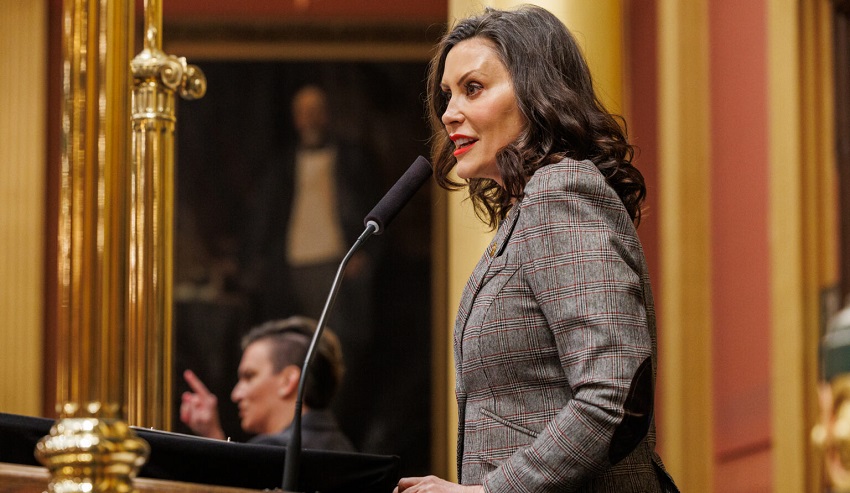Grand Rapids, MI – Governor Gretchen Whitmer delivered her seventh State of the State address on Wednesday, emphasizing bipartisan cooperation, economic development, and addressing the rising costs affecting Michigan families. Speaking before a joint session of the Michigan House of Representatives and Senate in the state Capitol, Whitmer outlined her vision for the coming year and outlined key initiatives aimed at tackling the state’s most pressing issues.
Bipartisan Collaboration at the Forefront
Whitmer opened her speech by expressing gratitude to Michigan’s legislative leaders and highlighting an important gesture of unity: the renaming of Constitution Hall in Lansing to the Deborah A. Stabenow Building, in honor of the outgoing Michigan Senator. She then shifted focus to the importance of collaboration, stating her intention to work across party lines to find common ground, particularly on issues like lowering costs, improving infrastructure, and ensuring Michigan’s economic growth.
“My north star has always been collaboration,” Whitmer said, stressing that while she was not looking for confrontation, she would stand firm when necessary. She underscored that most Michiganders are united by similar concerns despite political divisions, noting that her administration had worked with both Democrats and Republicans on various issues, including the state’s budget.
Financial Health and Budget Proposal
The governor touted Michigan’s strong financial standing, citing a record-high rainy-day fund of $2.7 billion and the repayment of $26 billion in debt. She expressed optimism about the state’s fiscal responsibility, urging lawmakers to pass a balanced budget focused on “the fundamentals” by the end of June. Among her key priorities for the budget are further investments in roads, education, and trade relations with Canada.
Whitmer also addressed the looming issue of tariffs, particularly the proposed 25% tariffs on Mexico and Canada. While acknowledging the potential benefits of tariffs in some cases, she warned that such steep tariffs could hurt Michigan’s economy, drive up costs for families, and harm the state’s auto industry. She urged lawmakers and business leaders to continue advocating for smarter trade policies to protect Michigan’s economic interests.
Housing, Wages, and Healthcare
Addressing the housing crisis, Whitmer proposed an ambitious $2 billion investment to address Michigan’s shortage of 140,000 homes. Her plan would aim to build, purchase, and renovate nearly 11,000 homes, creating more than 10,000 construction jobs in the process. The governor framed this as a critical step in lowering costs and helping more Michigan families achieve homeownership.
On the issue of wages, Whitmer pointed to the recent deal passed on minimum wage and paid sick time, which she said would raise the minimum wage faster and provide Michigan workers with the “best earned sick time in the country.” She also highlighted the need to reduce medical debt, with nearly 700,000 Michiganders struggling with unpaid healthcare bills. She called for bipartisan support to introduce consumer protections to mitigate this growing issue.
Education and Workforce Development
A key part of Whitmer’s plan for the future lies in investing in education and workforce development. She proposed the largest investment in career and technical education the state has ever seen, building on successful programs such as Michigan Reconnect and the Michigan Achievement Scholarship. Whitmer emphasized the need to encourage more young men to pursue higher education and skills training, citing an imbalance where women currently outnumber men at community colleges and universities.
Roads and Infrastructure: A Long-Term Solution
Infrastructure remains one of the governor’s top priorities, with Whitmer calling for a sustainable, long-term solution to Michigan’s ongoing road funding issues. Her administration’s Rebuilding Michigan program, which provided short-term fixes, is nearing its conclusion, leaving the state facing a “serious funding cliff.” To address this, Whitmer proposed a $3 billion plan for road repairs, drawing on new revenue sources such as taxes on marijuana and big tech corporations. She also suggested that every dollar raised from gas taxes should be dedicated to road maintenance.
Social Issues and Health
On social issues, Whitmer called for bipartisan legislation to limit students’ use of cell phones during class, pointing to research that suggests reducing phone use leads to improved learning outcomes and less bullying. Additionally, she proposed a tax on vaping products, comparing it to the state’s existing taxes on cigarettes, to protect the health of Michigan’s children.
Closing Remarks
Whitmer concluded her address by painting a vision of Michigan as a national leader, highlighting the state’s reinvestment in manufacturing, its growing young adult population, and the success of recent sports teams like the Detroit Lions. “At our best, we’re strong and kind,” Whitmer said, urging Michigan to lead the way in a time when national divisions run deep.
With her ambitious proposals and call for unity, Whitmer set the tone for a year of collaboration and bold investments in Michigan’s future. Whether her vision can be fully realized will depend on continued cooperation between the state’s divided legislature, but the governor’s address made it clear that her priority is to move Michigan forward, with or without partisan consensus.







